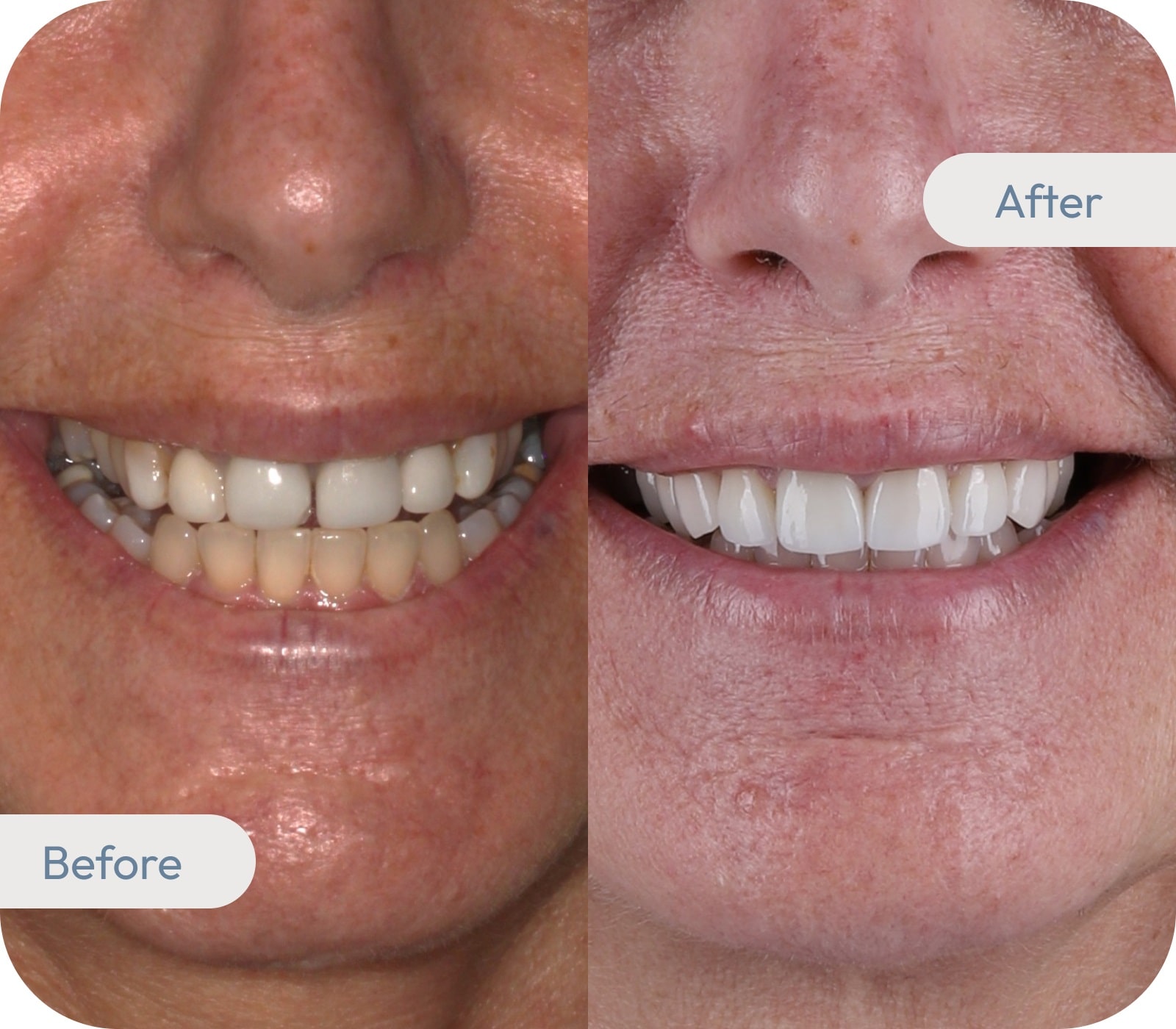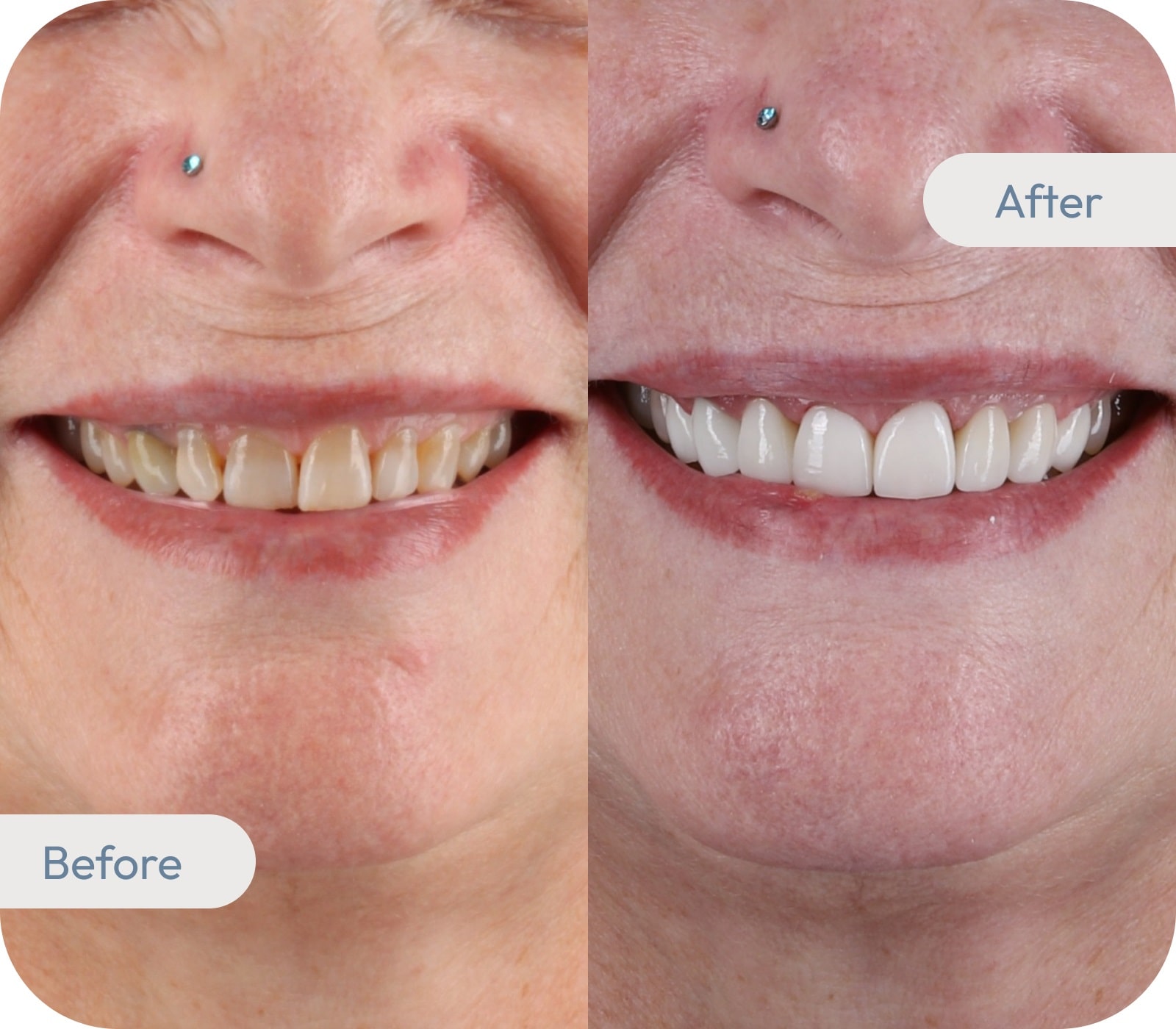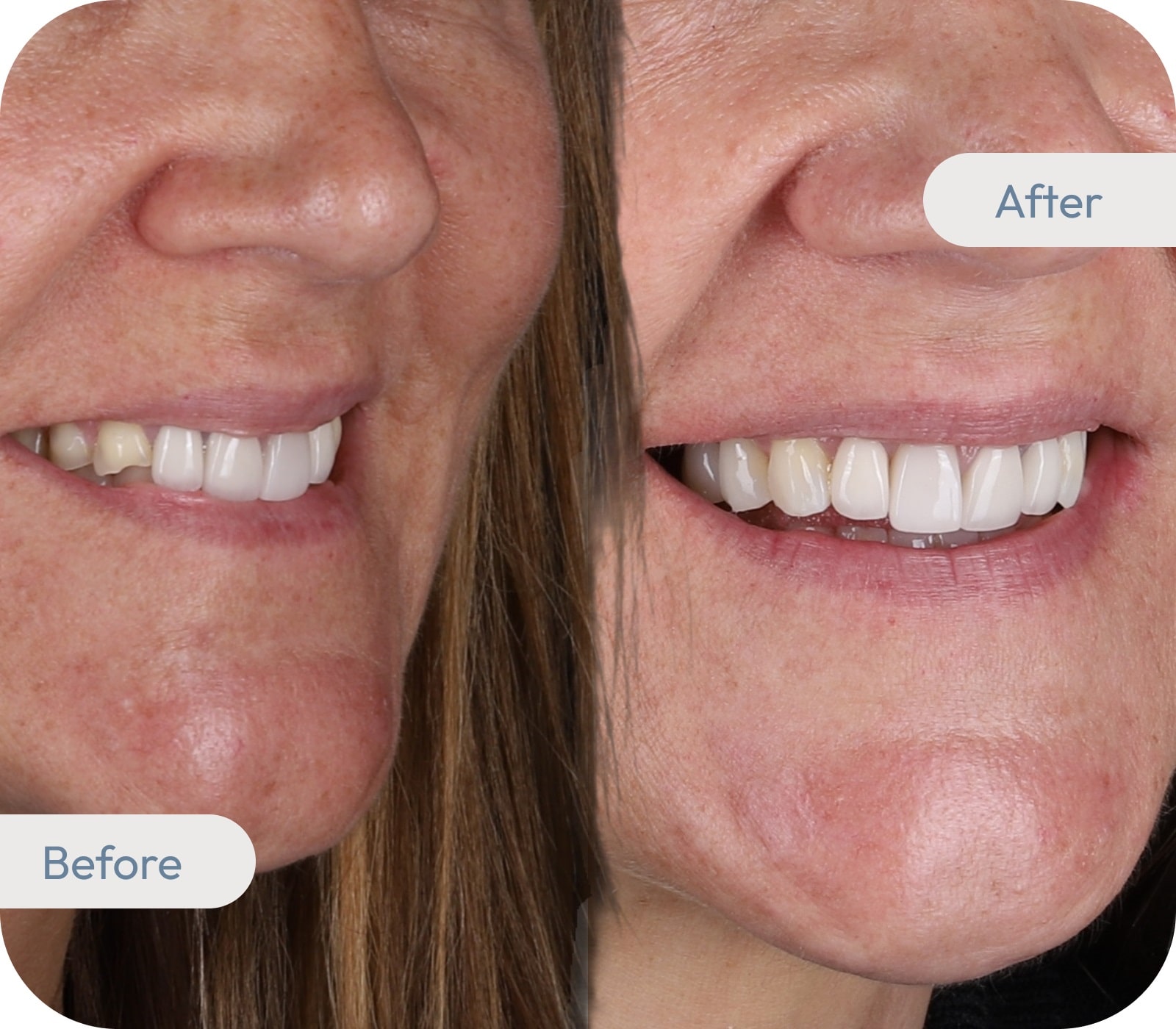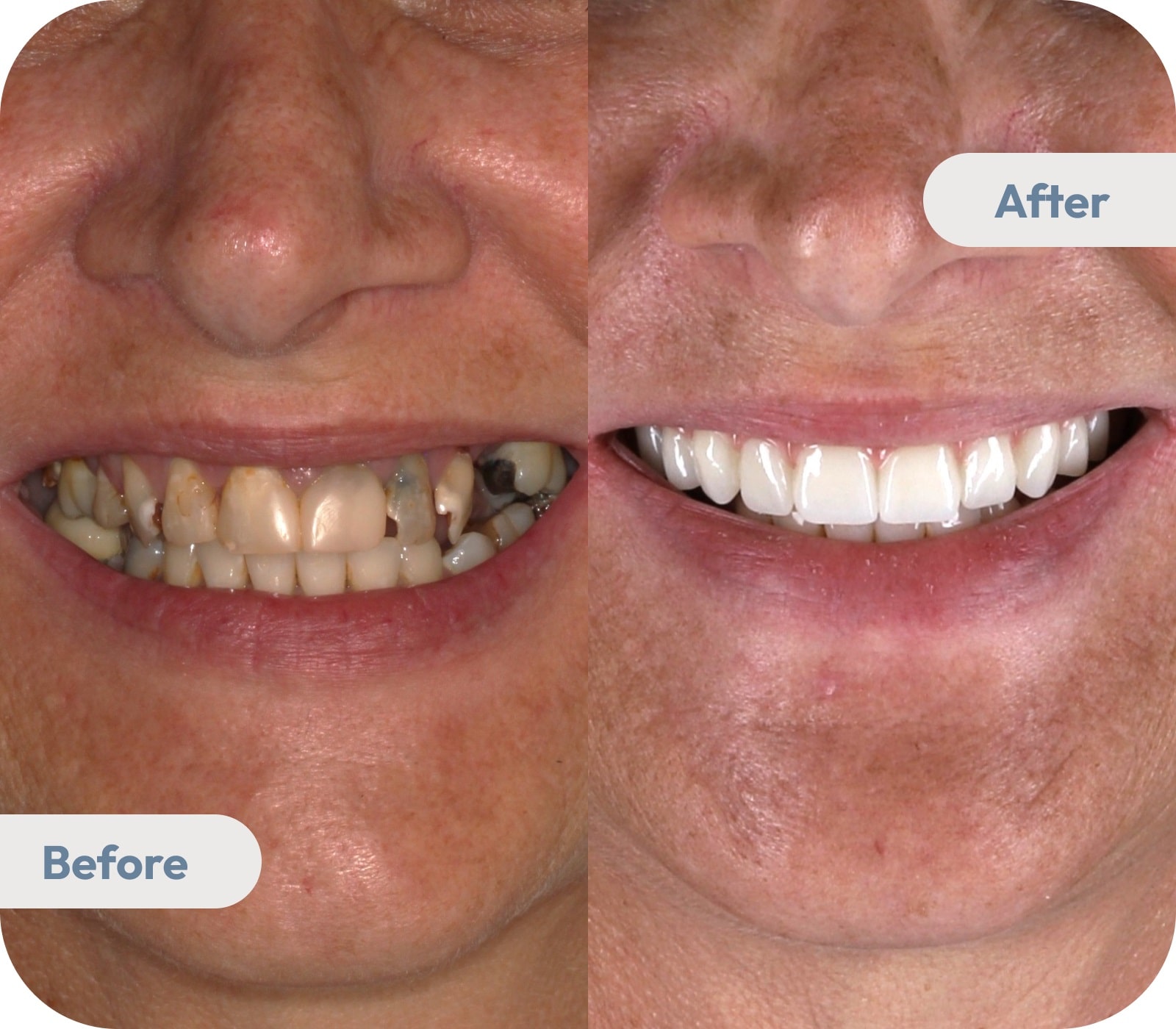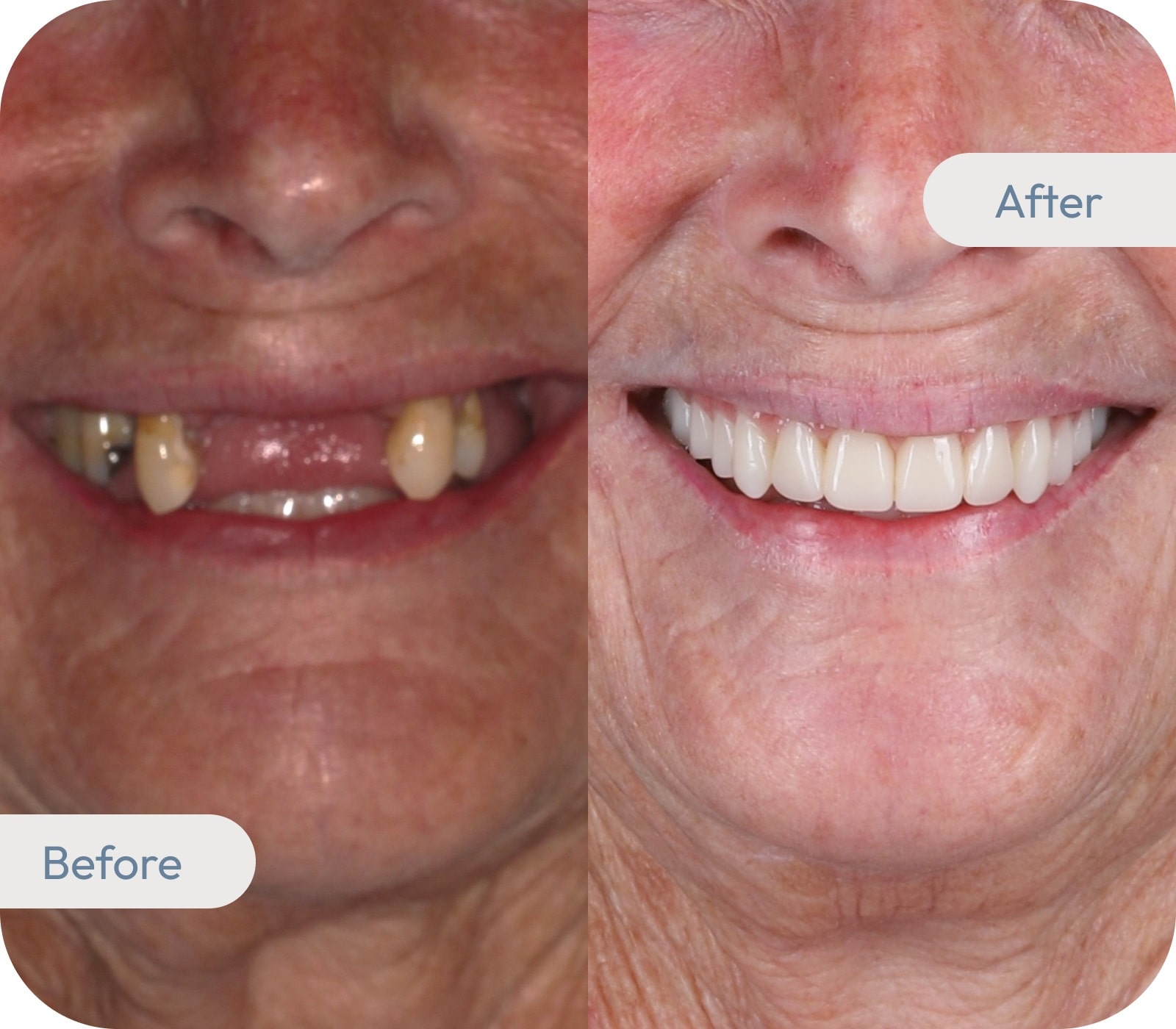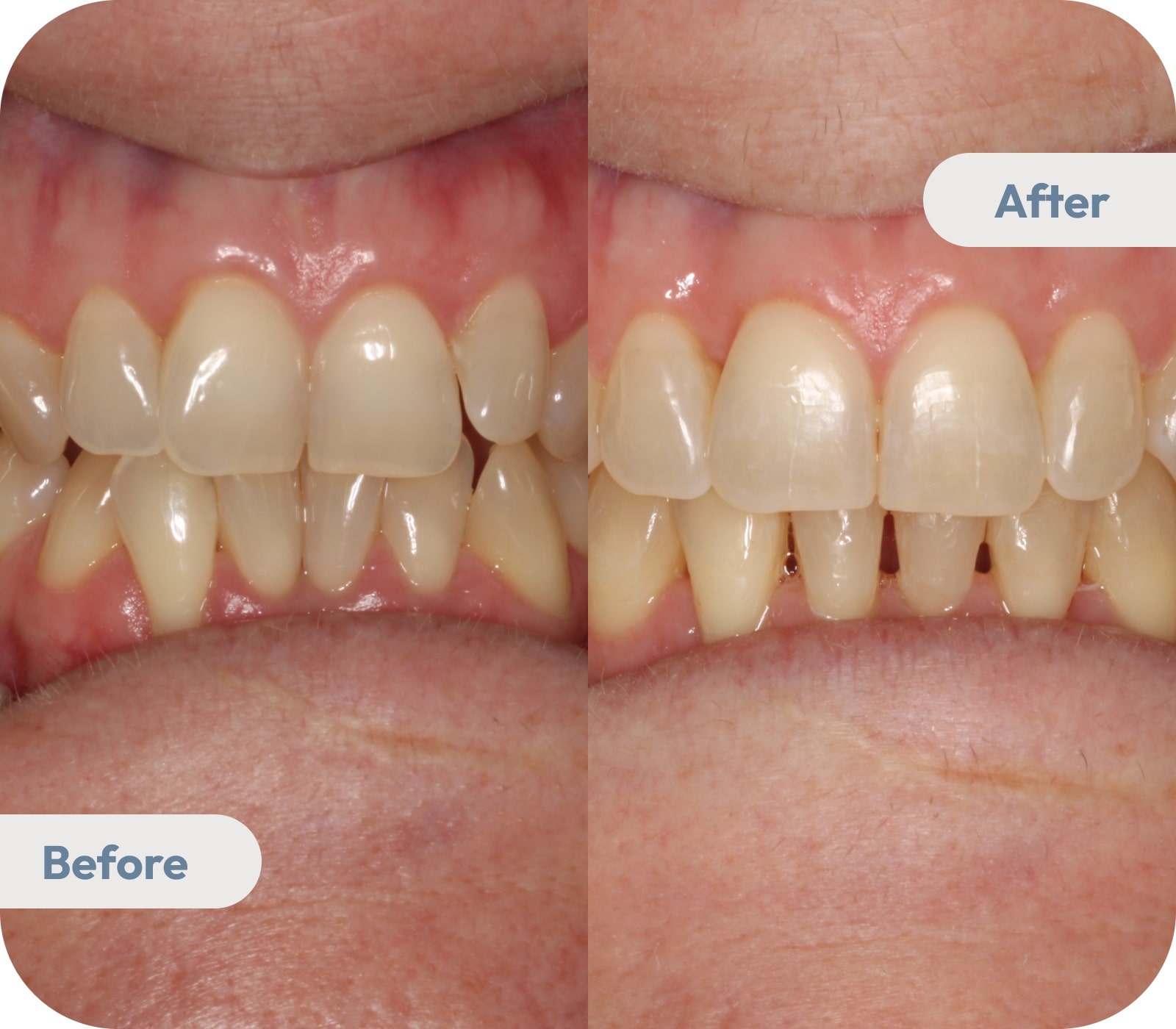Customised Options for Tooth Replacement
Eversmile Dental Offers Dental Bridges
in Bunbury
At Eversmile Dental, getting dental bridges in Bunbury is a personalised experience. A bridge can help restore function, improve your smile, and support long-term oral health with a design tailored to your individual needs.
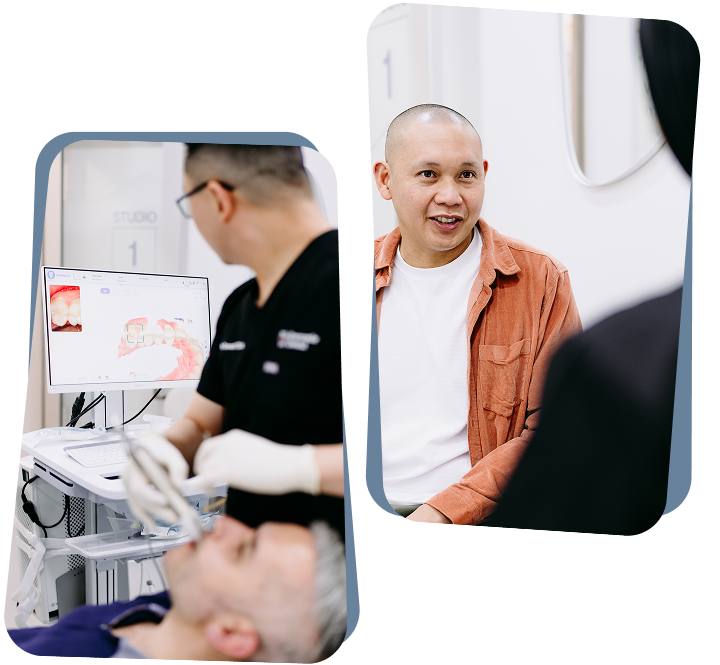
Restore Function and Appearance with a Dental Bridge
Your first visit to Eversmile Dental involves a thorough assessment of your teeth, gums, and bite. This helps us determine if a dental bridge suits your needs. It’s also a great time to ask questions, discuss your goals, and understand your treatment options. We focus on long-term oral health and explain each step clearly to support informed decisions.
Who Might Need
a Dental Bridge?
- Single Missing ToothIf you’ve lost a single tooth due to injury, decay, or extraction, a dental bridge can help. It restores chewing ability, protects your bite, and helps prevent nearby teeth from shifting into the space.
- Multiple Missing TeethWhen two or more teeth are missing in a row, a bridge can restore comfort and balance. It supports your bite, reduces strain on remaining teeth, and improves speech, chewing, and overall dental stability.
- Shifting or Unstable BiteMissing teeth can cause others to move and disrupt your bite. A bridge stabilises alignment, helps reduce jaw tension, and supports the structure of your smile to maintain long-term oral health.
- Visible Smile GapsA gap in your front teeth can affect speech and confidence. A dental bridge fills the space, is designed to match nearby teeth, and may make eating, talking, and smiling easier.


How Dental Bridges Improve Comfort, Function,
and Appearance
- Easier ChewingDental bridges restore your ability to bite and chew properly. This helps you enjoy a wider variety of foods again without discomfort, supporting your nutrition and making daily meals more enjoyable.
- Natural-looking Smile
Each dental bridge is designed to closely match the shape, size, and colour of your surrounding teeth. This helps your smile look more balanced and feel natural in social and professional settings.
- Improved SpeechMissing teeth can make it harder to pronounce certain words and sounds. A dental bridge fills those gaps, which may help you speak more clearly during everyday conversations and social situations.
- Stabilised BiteWhen teeth shift into empty spaces, it can change how your bite comes together. A dental bridge helps keep your bite steady, reducing stress on nearby teeth and supporting long-term function.
Speak With Your Bunbury Dentist About Your Dental Bridge Options
Take the next step towards exploring your dental bridge options. Our Bunbury team at Eversmile Dental will provide clear information and personalised guidance to support your long-term oral health.

What to Expect When Getting a Dental Bridge in Bunbury
When you get a dental bridge at Eversmile Dental, you’ll follow a step-by-step process designed to support function, patient care, and ongoing oral health.
At your first visit, the dentist will examine your teeth, gums, and bite to assess whether a dental bridge is suitable. This includes checking the condition of supporting teeth and discussing your treatment goals. It’s also an opportunity to ask questions and review your options. Eversmile Dental emphasises personalised care and long-term oral health with treatment plans tailored to your individual needs.
To support the dental bridge, the teeth beside the gap are gently reshaped. This creates space for the bridge to fit securely and function as intended. Local anaesthesia is typically used to reduce discomfort during the procedure. Tooth preparation helps provide a stable foundation and allows the final bridge to be designed to match the shape, colour, and alignment of your surrounding teeth.
Eversmile Dental uses advanced digital scanning to capture a detailed 3D image of your teeth and bite. This method avoids the use of physical impression trays and materials. The digital scan is used to design your dental bridge with accuracy and consistency. Our in-house 3D printer may also be used to create a custom model or a temporary bridge while your final one is being prepared.
Your bridge is designed using detailed digital scans to align with your bite and surrounding teeth. A temporary bridge may be 3D-printed and fitted while your final bridge is being prepared in the lab. During your fitting appointment, the bridge is adjusted to support function and appearance. At Eversmile Dental, we carefully check fit and alignment so your new bridge is designed to integrate with your daily oral routine.
After your bridge is placed, follow-up visits allow us to review fit, function, and patient-reported comfort. Our team will provide guidance on caring for your bridge, including brushing, flossing, and regular dental check-ups tailored to your needs. Ongoing care at Eversmile Dental is designed to support the bridge, surrounding teeth, and your overall oral health, helping to extend the effectiveness of treatment with good daily maintenance.
Smile Gallery – Before and After Treatment Examples
Explore real treatment outcomes in our gallery. These before-and-after photos show actual patients of Eversmile Dental, displayed with their consent. Outcomes vary between individuals, and results are not guaranteed. Images are unedited and taken under comparable conditions to reflect realistic treatment outcomes.
*These images display actual patients of our clinic. Every case is different, and treatment outcomes can vary according to individual conditions and needs.
Why Bunbury Turns to Us for Restoring Smiles
Restorative dentistry is about restoring and replacing teeth to maintain function, comfort, and oral health. At Eversmile Dental, we combine experience, empathy, and modern technology to deliver care that supports your long-term oral health.
-
- Local Care, Genuine Connection
- We’re more than a dental team—we’re your neighbours, your kids’ schoolmates, and your fellow locals. Living and working in Bunbury means we understand the pace of life here and the needs of the people we serve. Our care is personal because this is our community, too, and your well-being matters to us.
-
- Providing Restorative Dental Care in Bunbury Since 2006
- For nearly two decades, our team has been providing restorative dental treatments for the Bunbury community. We offer crowns, bridges, and dentures, using established dental techniques and technology. The dentists at Eversmile Dental draw on their extensive experience to guide their approach to restorative care.
-
- Restorative Treatments for Different Age Groups
- Restorative dentistry can be applicable at different stages of life, depending on individual oral health needs. From restoring damaged teeth to replacing missing ones, our team offers a range of treatment options. We also emphasise prevention and long-term care to assist patients in managing their oral health over time.
-
- Restorative Care Designed Around You
- We recognise that every patient’s needs are unique. Our team takes the time to listen carefully, explain available treatment options, and answer your questions. Together, we develop a plan that reflects your oral health needs, personal preferences, and budget. Our goal is to help you make treatment decisions that are clear and well-informed.
-
- Professional Standards in Restorative Dentistry
- Our restorative care is based on current dental standards and supported by clinical evidence. We explain the purpose of each recommended option, allowing you to make informed choices about your treatment. Our focus is on delivering appropriate care in line with recognised professional guidelines.
-
- Incorporating Modern Technology into Patient Care
- Our clinic incorporates technology such as digital scans, CBCT imaging, and in-house 3D printing into patient care. We use these tools to assist in the planning and delivery of restorative treatments, including crowns, bridges, and implants. They are integrated into the way we provide restorative dentistry at Eversmile Dental.
Frequently Asked Questions
Dental bridges are a common way to replace missing teeth and restore everyday function. If you’re considering this treatment, learning more can help you make an informed decision.
How long do dental bridges last?
Dental bridges are designed to replace missing teeth while restoring both function and appearance. With regular care, many bridges last for several years, though results vary between patients.
Several factors can influence how long your bridge lasts. Here’s what matters most:
- Bridge material: Porcelain-fused-to-metal and zirconia bridges are commonly used materials, designed for strength under normal biting pressure.
- Oral hygiene: Cleaning under the bridge and brushing twice a day helps prevent gum disease and decay in the supporting teeth.
- Habits and diet: Avoiding hard or sticky foods and not grinding your teeth can help protect your bridge from damage.
- Regular dental visits: Your dentist can monitor the bridge, clean hard-to-reach areas, and identify potential issues before they become serious.
If you are looking for ways to replace missing teeth in Bunbury, our team is here to explain your options and provide guidance suited to your oral health.
How much do dental bridges cost?
The cost of a dental bridge can vary. It depends on the type of bridge, the materials used, and whether any preparatory treatment is needed.
At Eversmile Dental, we provide personalised treatment plans. After your consultation, you’ll receive a clear, written quote tailored to your needs.
Here are some estimated starting prices for common dental bridge types:
- Cantilever bridge with crown: This option may start from $3,090 to $4,085, supported on one side by a single tooth.
- Traditional bridge with two crowns: This bridge may cost from $4,790 to $6,185, anchored by crowns on two neighbouring teeth.
- Maryland bridge (with wings): This option starts from $1,358, often used on front teeth with bonded metal or ceramic wings.
- Three-unit bridge: This bridge may start from $2,745, replacing one tooth with support from crowns on adjacent teeth.
These prices are indicative only and will vary. The final cost depends on your clinical condition, the materials used, and the treatment requirements.
If you’re considering a tooth bridge in Bunbury, our dental team can explain your options and recommend an approach suited to your oral health.
Are dental bridges worth the money?
For many people, a dental bridge may provide functional and aesthetic benefits by restoring the ability to chew and speak properly after tooth loss.
Many patients consider bridges a worthwhile investment for the following reasons:
- Restored function: A bridge can support chewing and clearer speech, especially if a front or molar tooth is missing.
- Appearance: Modern bridges are colour-matched to your teeth. They are designed to improve dental alignment and may prevent nearby teeth from shifting.
- It stays in place: A bridge is cemented and secured to neighbouring teeth. It does not need to be removed for cleaning or everyday use.
- Long-term value: With proper care, a dental bridge may last for several years, though results vary between patients.
While upfront costs may seem high, a bridge is one option that may support long-term oral function and health.
Our dental clinic offers dental bridges as part of our personalised approach to restorative dentistry in Bunbury, helping you choose a treatment that fits your oral health needs.
Who is not a good candidate for a dental bridge?
While dental bridges suit many people, they are not advisable for every case. Careful assessment is needed before selecting this treatment.
Situations where a dental bridge may not be recommended:
- Weak supporting teeth: Nearby teeth must be healthy and stable. If they are damaged or loose, they may not support a bridge properly.
- Advanced gum disease: Severe gum disease can lead to bone loss. This affects the support needed to keep a bridge in place.
- Multiple missing teeth: A bridge may not suit larger gaps. In these cases, partial dentures or dental implants may be more appropriate for better stability and function.
- Poor oral hygiene: Daily cleaning is essential with a bridge. Without it, the supporting teeth may develop decay or gum problems.
If you’re looking for a missing tooth replacement, the Eversmile Dental team can help you choose a suitable and effective option suited to your oral health needs.
What is the failure rate of dental bridges?
Dental bridges have a strong track record when planned, placed, and maintained properly. Like all dental treatments, some may fail over time.
At Eversmile Dental, we assess your case before recommending a bridge and offer regular care to help support long-term outcomes.
According to a Dutch study published in the Journal of Oral Rehabilitation, about 87% of dental bridges were still functional after 12 years when supported by healthy teeth and good care.
Bridges tend to last longer when supported by healthy teeth and gums. Poor oral hygiene increases the risk of problems over time.
Common causes of failure include gum disease and decay around the supporting teeth. These can often be reduced with good care and regular check-ups.
If you’re exploring your options at a Bunbury dental clinic, our team will discuss risks, maintenance, and ways to protect your bridge.
What are the disadvantages of a dental bridge?
While dental bridges are a popular option for replacing missing teeth, they come with some limitations that patients should consider before choosing this treatment.
Things to consider before choosing a dental bridge:
- Involves preparation of healthy teeth: The teeth on either side of the gap must be shaped to support the bridge, even if they are healthy.
- Higher risk of decay: If cleaning around the bridge is difficult, the supporting teeth may develop decay or gum disease over time.
- It may not last as long as other options: Although bridges are durable, other treatments, such as implants, may be considered depending on individual oral health and maintenance needs.
- Not suitable for all cases: If you have significant bone loss or several missing teeth, other treatments may be more appropriate than a bridge.
If you’re exploring dental bridges in Bunbury, we can help you weigh the pros and cons based on your situation. Our goal is to help you choose a treatment that suits your oral health needs. We’ll walk you through all the options during your consultation.
Do dental bridges cause problems with chewing or speech?
Dental bridges are designed to help restore function, including chewing and speaking. Most patients adjust over time, although experiences vary.
What you may experience after getting a bridge:
- Mild adjustment period: It may take a few days to get used to chewing or speaking with a newly placed bridge.
- Initial changes in speech: Some people notice a slight lisp or change in pronunciation. This usually improves as your tongue adapts.
- Chewing sensitivity: You might feel mild sensitivity when eating, especially as the supporting teeth adjust. This usually settles with time.
- Bite feeling uneven: If the bridge affects your bite, follow-up care may be needed to improve balance and comfort.
If you notice changes that don’t improve within a few days, it’s important to follow up with your dentist. Early adjustments can improve comfort and everyday function.
What is the difference between a bridge and an implant?
Both dental bridges and implants are used to replace missing teeth, but they differ in how they are placed, maintained, and supported.
Understanding the difference can help you make a decision that aligns with your oral health needs and personal preferences.
Key differences between bridges and implants:
- Placement method: A bridge is supported by nearby teeth. An implant is placed directly into the jawbone and functions in a way similar to a tooth root.
- Impact on nearby teeth: Bridges require shaping of the teeth next to the gap. Implants do not affect surrounding teeth.
- Bone preservation: Implants help maintain jawbone density. Bridges sit above the gum and do not prevent bone loss in the same way.
- Procedure length: Completing a bridge usually takes less time. Implants usually require several months, including healing time after placement.
- Longevity: Both options are designed to be long-lasting, although results vary depending on individual oral health and care.
Your dentist can assess your oral health, bone structure, and preferences to help you choose the right replacement for your missing tooth.
Can a dental bridge be used if I'm missing multiple teeth?
In some cases, a dental bridge can replace more than one missing tooth as long as the supporting teeth are healthy and well-positioned.
A dentist will assess your teeth and gums to decide whether a bridge is suitable for the gap and your overall oral health.
The following factors affect whether a bridge can replace multiple teeth:
- Gap size: A longer span places more pressure on the teeth holding the bridge. The design must allow for adequate and stable support.
- Tooth strength: Supporting teeth must be stable and free from disease. If they are weakened, a bridge may not be the right option.
- Types of dental bridges: Some bridge designs, including traditional or implant-supported options, may be better suited to replacing multiple missing teeth.
- Alternative treatments: Depending on the space and support, your dentist may also discuss partial dentures or dental implants.
Your dentist will recommend an approach that suits your oral health needs and the number of teeth requiring replacement.
How do I take care of a dental bridge?
Looking after your dental bridge is important for keeping it functional and protecting the teeth and gums that support it.
With daily care and professional check-ups, a bridge may remain functional for many years, although results vary.
Tips for caring for your dental bridge:
- Brush twice daily: Use a soft toothbrush and fluoride toothpaste to clean all surfaces, including around the bridge and gums.
- Floss underneath: Use floss threaders, interdental brushes, or water flossers to clean under the bridge where food and plaque can build up.
- Avoid hard or sticky foods: Biting down on hard lollies or chewing gum may damage the bridge or loosen the supporting teeth.
- Attend regular check-ups: Your dentist will check the fit of the bridge, examine the supporting teeth, and perform professional cleaning.
- Watch for changes: Let your dentist know if you feel discomfort, notice sensitivity, or have trouble cleaning around the bridge.
A well-maintained bridge may help support oral health and function over time. If you’re looking for guidance, our dental team is here to help.
Can food get stuck under a dental bridge?
Yes, food can occasionally become trapped under a dental bridge, especially near the gum line where the bridge meets your natural tissue. This can happen and is manageable with the right cleaning techniques. Daily care helps prevent plaque buildup, gum irritation, and bad breath.
What to know about food impaction under a bridge:
- Bridge shape and position: Small gaps between the bridge and gums are needed for cleaning access. These spaces may trap food during meals.
- Cleaning tools: Floss threaders, interdental brushes, or water flossers are useful for reaching underneath and around the bridge each day.
- Daily care matters: Food particles left under a bridge can lead to gum inflammation or decay in the supporting teeth if not removed regularly.
- Professional cleaning: Regular visits to your dentist allow for deeper cleaning and early detection of any issues beneath the bridge.
If you’re finding it hard to clean under your bridge, speak with your dentist about tools or techniques that suit your needs and preferences.
Is it ever too late to get a dental bridge?
In some cases, it may be possible to place a dental bridge even if the tooth has been missing for some time. However, an assessment is needed.
The condition of the surrounding teeth and gums, as well as bone levels, will influence whether a bridge is a suitable option.
Factors that may affect timing:
- Bone and gum changes: Over time, the jawbone may shrink, and gums may recede. This can change how a bridge fits or functions.
- Tooth movement: Nearby teeth may shift into the gap if it remains open for too long. This can make it harder to place a bridge.
- Support structure: A bridge relies on healthy teeth next to the gap. If these are damaged or missing, other treatments may be recommended.
- Assessment required: Your dentist will examine your mouth, review any changes, and advise on whether a bridge is still a suitable option.
If you’re considering dental bridges, the team at Eversmile Dental can assess your case and explain the options available to you.
Various Payment Options Available
Eversmile Dental offers a range of flexible payment options to assist patients in managing the cost of their dental care. Please ask our team for details about the payment plans available.
Book Your Appointment Online or Call Our Bunbury Dental Clinic
Book an appointment with our dentist in Bunbury to discuss your oral health needs. We provide tailored dental treatments and clear information to support informed decisions about your dental care.
